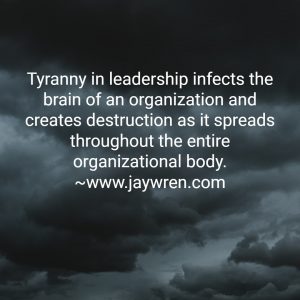Tyranny: Leaders can become cruel. They can use their power to oppress, abuse, and cheat workers. Ultimately, tyrannical leaders can destroy an organization. On the other hand, great leaders lift their workers to create great organizations with people who enjoy professional success. What elements create great leaders who instill confidence and workplace engagement?
Tyranny in leadership infects the brain of an organization and creates destruction as it spreads throughout the entire organizational body.
~ www.jaywren.com
Leadership
Leadership is a trait that can start from any place in an organization. Usually leadership starts at the top and runs throughout the entire organization. By picking and developing winning teams, great leaders create great organizations.
Tyranny in Leadership
However, bad leaders, especially leaders who practice tyranny, can create failure in any organization. The Caine Mutiny is a novel about a commanding officer, LCDR Philip Francis Queeg, whose endless mistakes and tyrannical command create such desperation among the officers that they commit mutiny. Herman Wouk, the author of The Caine Mutiny, drew upon his knowledge from World War II experiences aboard a similar vessel, the USS Zane.
The book dramatically portrays leadership failure. The mistakes, tyranny, and dishonesty of Captain Queeg result in mistakes among the officers and crew and create dangerous and embarrassing situations for the ship under his command, the USS Caine.
As I said in an earlier post, there is a saying in the United States Navy, “So goes the captain. So goes the wardroom. So goes the ship.” A bad captain creates bad performance among the officers who in turn create bad performance among the people who work for them. On the other hand, great commanding officers raise the performance of their officers and in turn their crew.
The same principle applies in any organization.
Brilliance Exists at All Levels
Great leaders know that brilliance exists at all levels of their organization. Furthermore, great leaders have left great quotes to instruct us on leadership. During World War II, Fleet Admiral Chester William Nimitz was the Commander-in-Chief, US Pacific Fleet. Additionally, he was Commander of the Pacific Ocean Areas for U.S. and Allied air, land, and sea forces. Here are two quotes from Nimitz that show his view of leadership.
“Leadership consists of picking good men and helping them do their best.”
“Some of the best advice I’ve had comes from junior officers and enlisted men.”
Rather than abuse the people who work for them, great leaders see these future leaders as sources of creativity and inspiration.
My Experience with Excellence in Leadership
The greatest leader I have known is Admiral Sylvester R. Foley, Jr., who, like Nimitz, was Commander of the U.S. Pacific Fleet. I knew him earlier on when he was my captain aboard the aircraft carrier the USS Midway. He would say things to encourage and to simplify the job for the people under his command. He clearly stated what he expected of you. Furthermore, he gave you credit when you performed with excellence.
Great leaders like Nimitz and Foley influence lives. The leadership I experienced under Admiral Foley gives me confidence and direction to this day. Tyranny destroys leadership. However, the best leaders create great leaders to follow them.
